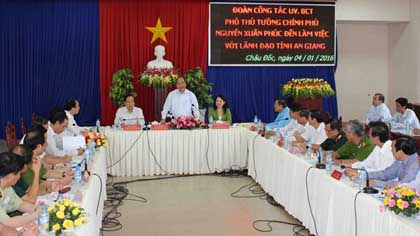An Giang holds potential to play key role in Mekong Delta
The Mekong Delta province of An Giang should accelerate its economic growth and climb to a high position in the region by 2020, Deputy Prime Minister Nguyen Xuan Phuc said during his working visit on January 4.
 |
| Deputy PM Nguyen Xuan Phuc speaking at the meeting (Credit: VGP) |
At the meeting, the Deputy PM stressed that An Giang is one of the biggest provinces in the Mekong Delta, and it has made important contributions to the region and Vietnam's development with specialties of rice and seafood.
To promote development, the Deputy PM instructed the province to enhance its Party Committee's leadership ability and State management efficiency; encourage democracy and discipline; exploit its economic strength; mobilise resources to develop agricultural cultivation; and create a foundation for trade, service, tourism and industry growth in order to improve local residents' living standards.
To reach such goals, Phuc suggested the province should focus on restructuring agriculture based on its strengths; promote start-up programmes; create a favourable environment to attract more resources for investment and development; implement deep research and studies in order to take advantage of integration in the future; and prepare to cope with climate change.
"Military and security forces are not allowed to let any unexpected situation happen in the province," he said.
To combat smuggling, the Deputy Prime Minister called upon local leaders to tighten and strengthen special task forces; increase co-operation among related authorities and enhance supervision to eliminate bribery; crack down on smuggling gangs; define major smuggling fields and tricks; and mobilise people's strengths and clarify personal responsibility as part of the anti-smuggling mission.
In addition, the deputy prime minister urged the province to realise the Government's resolution No.16 on improving the business environment, local enterprises' competitiveness and administrative reform, as well as applying IT in administrative reform.
For petitions related to socio-economic development of the province, Deputy Prime Minister Phuc will assign relevant ministries and sectors to consider and decide.
Provincial leaders issued reports to the Deputy PM on their plans to tackle these issues and also said that smuggling is being controlled step by step.
According to Ho Viet Hiep, Vice Chairman of An Giang Province's People's Committee, the province's socio-economic situation developed well last year, meeting 17 out of 24 targets.
The rate of households living under the poverty line fell by 2.5%.
The province had 13 communes that met the new-styled rural area standard - a set of criteria used to evaluate a rural area, such as transportation, lifestyle, agriculture and production - as of the end of 2015. The locality's export turnover was 930 million USD last year, Hiep said.
In administration reform tasks, An Giang ranked 11th out of 63 provinces and cities nationwide, and ranked third out of 13 provinces and cities in the Mekong Delta.
Administration reform will be one of three main tasks of the province in upcoming years.
An Giang has performed well in the tasks of inspection and corruption prevention, and it will invest more on administrative reform, he added.
This year, the province's Gross Regional Domestic Product (GRDP) is expected to increase 6.5%, with a more than US$1 billion export turnover and a VND4.47 trillion (US$203 million) State budget income.
The province expects to cut the percentage of households living under the poverty line to 1.5%, and aims for an additional six communes to meet the new-styled rural area standard.
Last year, authorities discovered 3,304 smuggled goods, an increase of 63% in comparison with 2014. They confiscated the items and issued fines of VND18 billion (US$800,000) and brought 86 suspects to court, which is 36 more than the number prosecuted in 2014.
(Source: NDO)
 về đầu trang
về đầu trang







